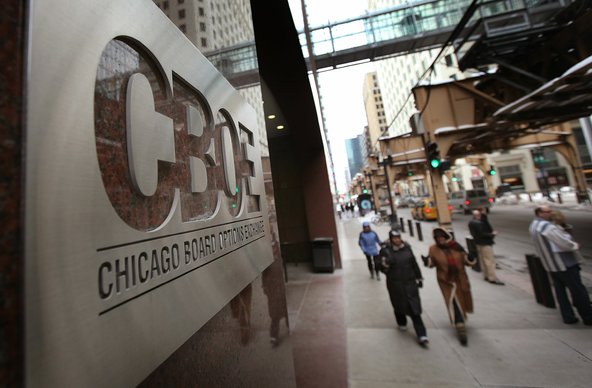 Scott Olson/Getty ImagesThe Chicago Board of Options Exchange building.
Scott Olson/Getty ImagesThe Chicago Board of Options Exchange building.
The Chicago Board Options Exchange opened after a delay of several hours on Thursday because of a system failure.
By early afternoon, the options exchange, the nation’s largest, said all of its systems were operating normally. But brokers who normally trade tens of thousands of options each day through the exchange sat on the sidelines for much of the morning, waiting for updates.
The exchange trades option based on the Standard Poor’s 500-stock index and the VIX index, a popular barometer of investor sentiment about volatility in United States equities markets. The contracts are important tools among investors seeking ways to hedge their stock holdings.
The system failure was the second example this week of technology intruding into trading in the United States. Earlier this week, a false tweet from The Associated Press that reported explosions at the White House caused the Dow Jones industrial average to plunge nearly 150 points in two minutes. The markets rebounded quickly after the A.P. said its Twitter account had been hacked.
It also comes on the heels of the botched stock market debut of Facebook last May, as well as a blowup at Knight Capital that rattled the markets and nearly toppled the firm.
In today’s rapid-speed electronic trading world, where high-frequency traders zip in and out of stocks and futures at speeds that are faster than the blink of an eye, the nation’s exchanges have sometimes struggled to keep up. Most famous is the “flash crash” of May of 2010 that sent the markets into a 1,000-point tailspin. It took regulators months to unravel what had transpired.
Now, the latest mishap in Chicago stoked fear among regulators and reignited concerns about the market’s vulnerability to broader shocks.
“The recurrence of technology glitches in markets means we need not blindly accept that the whiz-bang machinery will always work as well as it should have,” said Bart Chilton, a regulator at the Commodity Futures Trading Commission. “On the contrary, we need to open our eyes to that fact.”
A press release from the exchange said the delay was not the result of hacking but did not provide any more information about the system problem. Gail Osten, a spokeswoman for the exchange, declined to provide further information in an e-mail.
Edward Provost, the chief business development officer for the exchange, later said that a “software glitch” caused the failure, according to Bloomberg News. Mr. Provost made his remarks from an industry conference that he and other exchange executives were attending in Las Vegas.
Analysts said while investors could find alternatives to S.P. 500 options, few good alternatives were available for the VIX index.
The first notice that something was awry at the exchange came soon after 8 a.m. Eastern time, when the exchange’s system said that some users were experiencing “issues” downloading certain products. The exchange delayed its opening, expecting to start trading about 10:15 a.m. Eastern time, according to notices sent to traders.
That opening never happened. And for several hours the exchange could not provide an expected opening time. Finally, more than three-and-a-half hours past its usual opening, the exchange said all trading would begin at 1 p.m. Eastern time. About a half-hour later, the exchange reported all systems were operating normally.
Justin Kaechele, a trader for BFL Trading, said he got news that the system was down minutes before trading was supposed to begin.
“A lot of companies had some trades planned at that time,” he said. “I don’t know what happened with those, but we had some unhappy customers.”
With nothing to do, traders said they just waited, making small talk about things people typically make small talk about – sports, the headaches of buying a home, the rising cost of sending their kids to private school.
“We just sat in our booth and talked about personal stuff,” Mr. Kaechele said.
While waiting, said Brian Gilbert, a trader for Belvedere Trading, an absence of the continuous action that normally filled the room could be strongly felt.
“It was eerily quiet,” he said. “The most quiet I’ve ever heard it.”
In an industry where every minute is an opportunity to make more money, the lost time was frustrating. “I think everybody’s mad,” Mr. Gilbert said when asked to describe the mood inside. “Brokers probably lost business.”
Observers said while the failure most likely idled investors trading the volatility index this morning, they said it was fortunate that the equity markets were relatively quiet and stable.
“We would be having a very different conversation if the S..P 500 was down 50 points or more,” said Mark Sebastian, the chief operating officer of Option Pit, an educational and consulting firm. “It is kind of a slow day, so this wasn’t a big deal.”
Equity markets climbed higher during the morning, buoyed by robust corporate earnings. The S..P. 500 was up 13.09 points, at 1,591.94, in early afternoon trading.
As the problems in Chicago emerged on Thursday, the Securities and Exchange Commission mobilized its “market event response team” in Washington, a collection of experts at the agency that monitor trading mishaps in real-time, according to officials briefed on the matter. Concerns grew at the agency as the exchange failed to get back online.
“We have been monitoring developments, as is our practice,” said John Nester, an agency spokesman.
The commodities agency also consulted with the exchange, the officials said. But officials there stepped aside upon learning that the problems were contained to the equities side of the business.
The incident comes at a difficult time for the Chicago platform, as the S.E.C. ramps up its scrutiny of the nation’s largest exchanges. The S.E.C. is already investigating the Chicago exchange for not properly policing the markets. By Thursday afternoon, the officials said, the agency’s enforcement unit had not opened an investigation into the system problems.
The S.E.C. is also pursuing an investigation of how Nasdaq bungled Facebook’s public debut. The exchange said this week that it put aside $10 million to cover a potential fine from the agency.
Steven Yaccino contributed reporting from Chicago.
Article source: http://dealbook.nytimes.com/2013/04/25/system-failure-delays-options-exchange/?partner=rss&emc=rss
